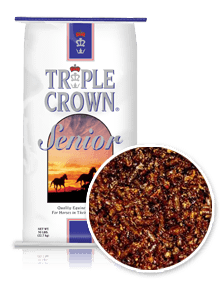 Roman is doing great on Triple Crown Senior!
Roman is doing great on Triple Crown Senior!
Roman has now been on Triple Crown Senior feed for 5 weeks now and is showing great improvement. With all of the recent rainy weather, he has enjoyed rolling and getting all muddy. His foster home is suspicious that he does it on purpose because he knows he’ll get brushed afterwards and he enjoys all of the love and attention!
Since Roman is so large, and also so malnourished, he is fed a bit more than the recommended 6 pounds of senior feed per day (half in the morning, half at night). He is benefiting from the higher nutrient content to make up for his older (and less efficient) digestive system. Triple Crown Senior has a higher fat content for extra energy, enough bulk fiber to make up for any lack of hay or grass, and it is also softer, which makes it easier on Roman’s system. In addition to his Triple Crown Senior feed, Roman is also given quality hay, access to pasture grass and clean, fresh water.
Roman is doing great, but in honor of him, and every other animal in his situation, we’d like to take a moment to explain what you need to watch out for, and what you can do to help your horse as they get older! Before Roman got to the state he was in, he could have been identified as malnourished by early weight loss, topline muscle loss, graying of the coat, and hollowing of the grooves around his eyes, as well as decreased hoof and hair coat quality. The following three things should be done for each aging horse, to ensure they have the best quality of life in their senior years.
Teeth Floating
The tool used to smooth down your horse’s teeth is a file, called a float (hence the term, teeth floating). Horse teeth never stop growing, and over time they can become sharp and uneven or fractured, making it hard for them to chew and even causing discomfort and pain. In this situation it is hard for your horse to eat feed, grass, and hay, and you may notice quids around their eating area. Quidding is when your horse tries to eat hay, but can’t properly chew and swallow it, so they essentially just wad it up in their mouth and spit it out, leaving behind quids on the ground as evidence of the teeth issues.
You can feed your senior horse a mix of senior feed and water to make a mash that is easy for them to swallow and digest while you are waiting to get their teeth floated.
Get Bloodwork done
As horses age they become at risk for metabolic issues, such as Cushings. If your horse has hormone imbalances, or organ failure, the only way to tell for sure is to get bloodwork done by your veterinarian. When you are caring for your senior pets, bloodwork is an essential step before you simply switch them to senior feed and assume all will be well.
Switch Your Horse to Senior Feed
Giving your older horse more of the same feed isn’t the answer. The feed just goes through them without the proper digestion and nutrient absorption. Proof of this can be seen if you examine your horses manure and see undigested grain.
Senior feed is softer, making it more easily digestible, and it is also specially formulated with high-quality ingredients to make up for your senior horse’s decreased ability for nutrient absorption and digestion.

As your horse ages their bodies are less able to break down their food into the essential elements that they need for proper nutrition. Senior feed has extra high-quality vitamins and minerals, such as protein, fiber, and phosphorus, and calcium, which is easier for your senior horse’s body to process. Senior feed has high quality nutrients for better absorption, added vitamins for the immune system, and pre- and pro-biotics to help with digestive efficiency and overall health.
When is Your Horse a Senior?
Generally, 15 years and older is considered a senior horse, but it varies for each animal. The best person to advise you on what is best for your horse’s health is your veterinarian.






 This week we shared a story about
This week we shared a story about 
